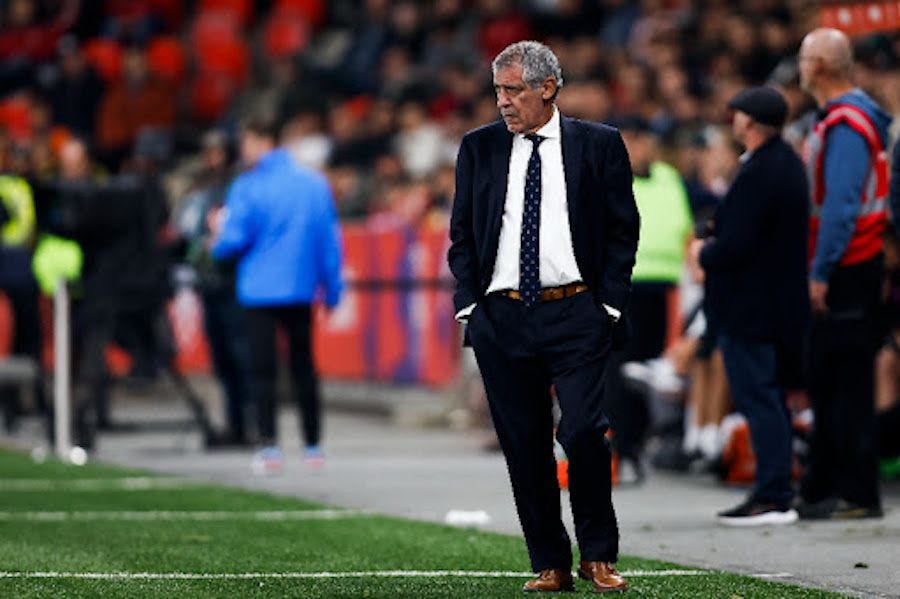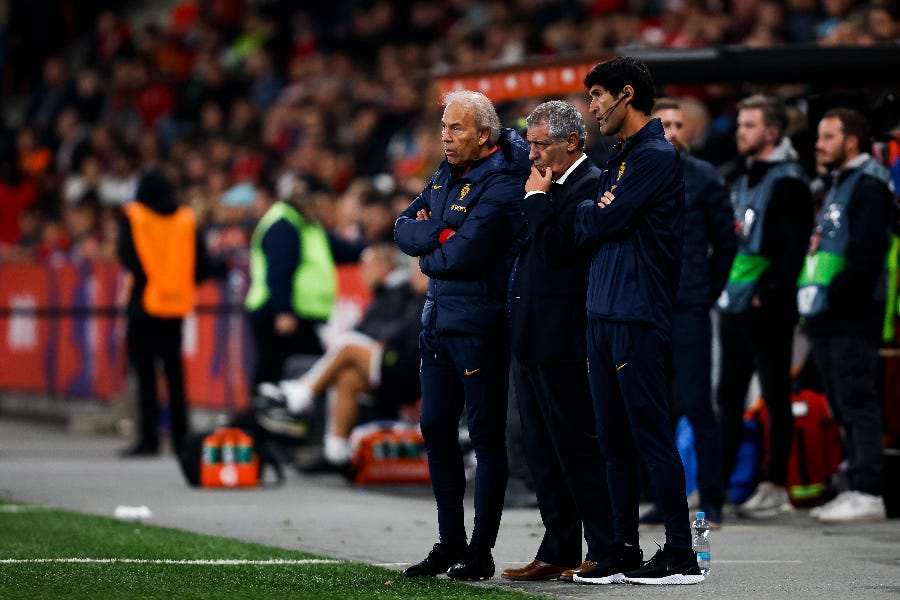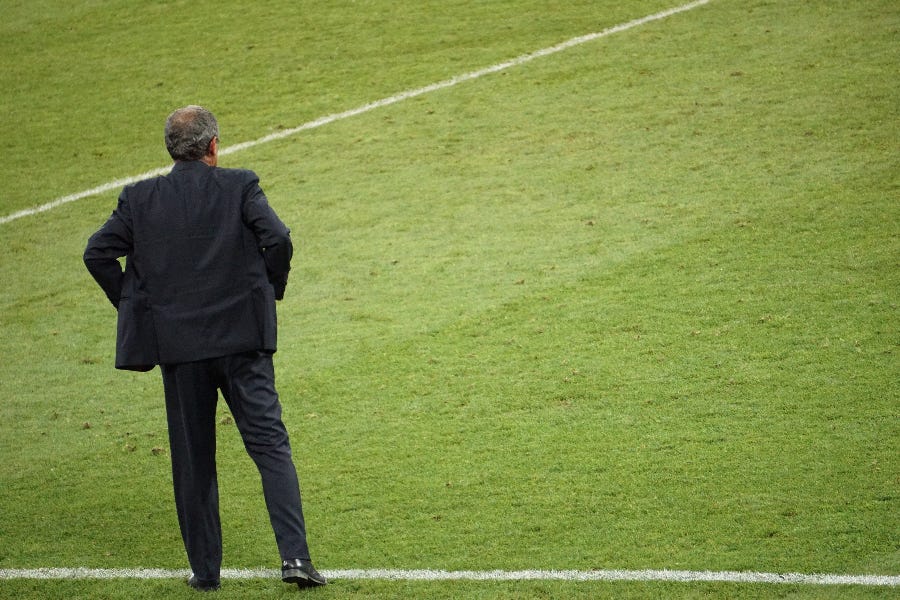
To some fans, soccer – or football, as it’s known outside North America – is a kind of faith, with its own rituals, temples, chants, and dogmas.
Of course, it isn’t (the Church of Maradona notwithstanding). But is there space for religion in football? Can true faith survive in a world where players cross themselves for luck, and the major tournament is mired in charges of corruption, facing a fan boycott over the human rights failings of host nation Qatar?
Just before the 2022 FIFA World Cup’s kicked off on Sunday, The Pillar talked religion and sports with Fernando Santos, coach of Portugal’s national team.
Portugal’s tournament will begin Nov. 24, when the team faces Ghana, followed by other group-stage matches against Uruguay, and South Korea.
For decades, Portugal dazzled at major tournaments with a style retired Dutch star Ruud Gullit termed “sexy football” — but the team consistently underperformed.
But in 2016, with Santos at the helm and the preternaturally gifted forward Cristiano Ronaldo as captain, Portugal won its first European championship.
The 68-year-old coach is now trying to achieve success in Qatar, but he told The Pillar that his real goal in life is a more lasting place — he said he aims to make his home in the heavenly New Jerusalem.
As a young man, Santos played as a defender in Portugal’s Premier League. After retiring at the age of 33, he began a successful career as a club coach, managing the country’s Big Three: Benfica, Sporting CP, and Porto. He oversaw the Greek national team from 2010 to 2014, when he was named Portugal’s coach.
In a phone interview with The Pillar, Santos spoke about his faith, which came late in life when he attended a retreat organized by the Cursillo Movement. He also talked about the ethical questions raised by playing in Qatar, and the impact of his long stint in Orthodox-majority Greece.
When Portugal won the 2016 European Football Championship, you read a letter at the press conference, which ended: “Finally, but foremost, I want to say some words to my best friend, and to His mother. To dedicate this victory to Him and to thank Him for having chosen me, and for giving me the gifts of wisdom, perseverance, and humility to guide this team, and for having guided and illuminated me. I hope, and wish, that it be for the glory of His name.”
Did you hear any negative feedback for that?
None at all, from anybody.
And how about favorable feedback?
Yes, that I did, especially from those who share my beliefs. Although this was nothing new, people know me, and they know what my beliefs are, and that I don’t change them, especially when it comes to faith.
A skeptic would say that it is easy to thank God when you win. How about when you lose? Can that be for the greater glory of God too?
Of course. The first thing I do in the morning when I get up, is to entrust my day to God, and the last thing I do at night is to thank God for my day. A lot of good things happen during my day, but a lot of bad things as well. Woe for us who have faith if we let that affect us.
God’s ways are different from ours. There might be things that I think would be good for me, but God sees it differently. There was a time, years ago, when I would thank God only for the good things that happened to me, but then most of the day I didn’t think of Him at all.
When you pray before or during a game, what are you praying for? Surely you are not expecting God to take sides.
Praying is speaking to God, and that is something I do all the time. At home, in the car, at any time, it is something intimate. There are also prayers of recitation, the Lord’s Prayer, which He taught us, or the Hail Mary. But what I do mostly, during the day, is just talk to God, and surrender myself unto him.
Of course, we can also ask Him for things, that is what He teaches us in the Lord’s Prayer, and in the Gospel we are told to ask and we shall receive, knock and the door will be opened. It is He who tells us to ask for things, and that Prayer has the power to win God over, in the good sense.
What I always ask is that He fill me with the Holy Spirit, and give me the gift of wisdom — of His wisdom, the wisdom of humility — and the gift of strength, determination, perseverance. This is what I ask for every day, that He supports me.
Of course, we all know that God would never take sides in a football game. Otherwise, what would He do when two people are praying in the same way for opposing teams? But if we believe, if we have faith, then we can look out for His signs.
There is a lot of superstition in football, and we often see players or others involved in the game using religion for luck…
I wouldn’t even classify that as religion.
But do you ever feel that you run that risk of blurring the lines? Of depositing hope for success in religious rituals?
No, because I spent a lot of years on the other side. I didn’t have real faith, or I had very little. I received sanctifying grace with my baptism, so there was some faith, but in terms of a strong conviction, belief in God, that only came when I realized that what defines Christianity is the Resurrection of Christ; his Passion, death, and Resurrection.
There was a time when I had never really heard about the Resurrection, or at least I had never taken it very seriously. Nor did I take seriously the notion of the living presence of Christ in each of us. I always thought it was something very distant, and it didn’t occur to me that I could have a personal encounter with Him.
In those days, I had my superstitions. I would wear the same clothes, take the same route, go in through the same door. But I think this happens in many activities, not just in football. Bullrings have chapels. In the theater, they always put their right foot forward first and use certain expressions. That is not what I mean when I talk about faith.
I have faith in Jesus Christ. I know that He rose from the dead, and I know what He wants for my life, and that is what I try to do so that one day I too may rise from the dead, and live in the New Jerusalem.
📰
Have you ever felt you needed to hide your faith?
Several years ago, I invited some friends to my weekend house in the country, and on Sunday I skipped Mass. My wife asked me about it, and I said it would be awkward to go and leave our guests home alone, so I didn’t go.
But then I realized how stupid I was being. The next time we had friends around, and every time since then, I go to Mass, and if my friends don’t want to go, they stay behind. We have to respect our differences, but never waver in our beliefs. Of course, if the opportunity to talk about this comes up, then we can talk, and each defend our points of view.
I spent many years managing in Greece. And the first thing I did when I arrived was to warn the board of directors that on Sunday morning I needed somebody to take me to the Catholic church and to bring me back. They were Orthodox, and they always respected me and complied.
As a coach, you spend a lot of time with the players, especially at big tournaments like this. Do you ever use that time to share your faith?
That is out of the question, whether in national teams, or in clubs. I can’t show up in the dressing room and start talking about religion, because there are players who don’t have any faith at all, others have different beliefs, so this is not the right place for this kind of dialogue.
But a player who knows about your religious beliefs could seek you out and ask to talk. Does that happen?
That is different, yes, that has happened. Since I’ve been coaching Portugal, during major tournaments, every Sunday I go to Mass. The players all know I go. Everybody knows. My faith is out in the open for all to see. People know I am a Catholic. They know what I believe. They know I go to Mass. They know everything about me. That is what is important. It would be wrong, however, for me to hide these things when I am with them, and that is something I will never do.
So, yes, sometimes, over these many years, players ask me questions, or we chat about things. And that includes players who have a different faith. For instance, all the Greek players I managed were Orthodox and that didn’t limit my conversations with them. Quite the contrary.
Start your day with Starting Seven - a daily news roundup in your inbox.
What did you learn from that experience in Greece, a country that is so profoundly Christian yet not Catholic?
That was probably the place where I had more conversations about faith, because we share about 99% of our beliefs. We would often talk about why we are divided, and they would ask me questions and we’d exchange opinions. This sort of ecumenical dialogue was very common.
At one point, I went to spend a few days at Mount Athos, which was really special for me. I went with some Greek friends, including two Orthodox monks. We slept in a small monastery and it was a fantastic experience. We’d stay up until the early hours just chatting about faith, the Church, Orthodoxy, and other religions. These are things that bring us closer together. We are, after all, brothers in Christ.
Once I was traveling in Greece with two Portuguese Catholic priests who were visiting me to travel the St. Paul trail. One of my closest friends, Brother Yosef, is an Orthodox monk who lives in one of those monasteries, where I had stayed several times. But when I appeared with my Catholic priest friends, it was quite awkward. It’s not that we were not welcomed, but there was some tension. I was the only one who seemed to feel at home.
Then I remembered that they all loved football. My two friends supported Lisbon-based Sporting, and the Greek monk was a Panathinaikos fan, and both clubs wear green. When I brought up that subject, the Greek monk said: “Well then, we share a passion for green!” From that moment, the tension evaporated and soon enough he had invited us to stay for dinner.
Another time I was visiting that same monastery, the abbot asked if I wanted to go with them to another monastery deep in the woods that is usually inaccessible to tourists. I said yes, of course. When we arrived, I don’t know if he was testing me, but he mentioned that the monastery was dedicated to St. Simeon and St. Anne, and I remarked that they were the ones who were in the Temple when Jesus was presented.
He seemed surprised and asked: “How do you know these things?” And I answered: “I’m guessing my Bible is pretty much the same as yours.” This is how I gained their respect.
I’d often take my Bible and sit and drink a coffee, and they would come to me and chat about religion. This is the sort of dialogue that builds bridges, because most of our beliefs are the same. We believe in the Resurrection. Whether you have married priests or not, whether the Holy Spirit proceeds from the Father or from the Father and the Son, all this pales in comparison to the common belief in the Resurrection.
📰
This is the first time a World Cup will be played in a Muslim-majority country. Have you received any instructions not to show outward signs of religiosity?
Definitely not. Neither from FIFA, nor from the Portuguese Federation. And I don’t believe that could happen. But even if it did happen, I would not comply.
Of course, I’m not exactly going to go into the street and start preaching. We have to have respect and not do anything to offend the local culture, the same way we hope they would not come and offend ours.
This World Cup has been widely criticized. The British newspaper The Guardian revealed that 6,500 migrant workers died in Qatar since it was announced that the country would be hosting the tournament. At least 37 of these deaths were of migrants working directly on the stadiums, but most are thought to have been on the massive infrastructure works linked to the competition. Most of the Christians in Qatar are migrants and many of those who died would have been Christian.
Are these things that worry you?
Human rights are definitely something that worries me. Over a year ago, I participated in a campaign in defense of human rights. Obviously, all these issues that have to do with tolerance and human rights worry me, in the sense that I fight for improvement, and this is very important.
We should all be concerned about this and speak out against things we don't agree with, but there are also plenty of opportunities to try to change things for the better. Having the right attitude can lead others to understand that they are doing things the wrong way.
And is this World Cup such an opportunity?
I think it could be. It depends on the good will of all those involved. As I said, it is not a question of hiding our beliefs, and who we are, but if we can take steps for things to improve, be it in Qatar, or any other place, then that is what we all have to do.







